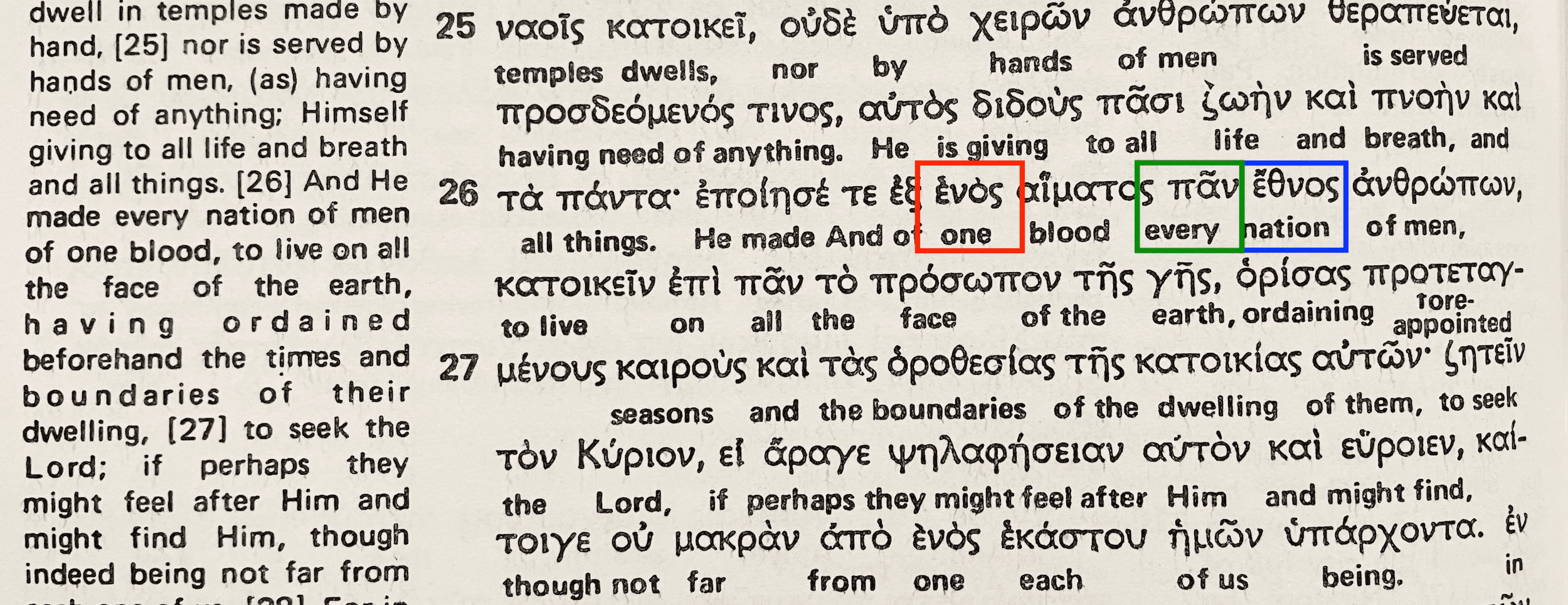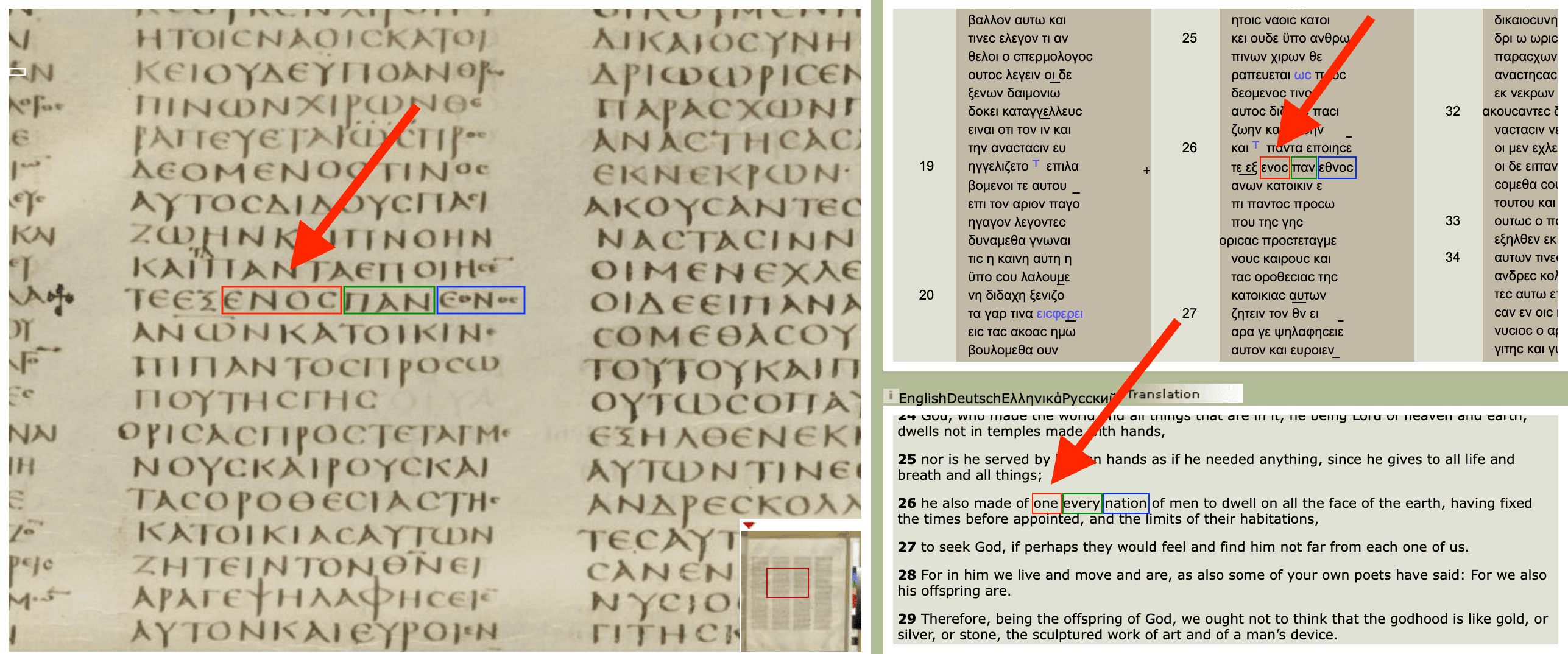You are probably familiar with the phrases, “from one blood came all nations” or “one blood all nations.”
These phrases are derived from Acts 17:26, and vary depending on which Bible translation you are reading from. Most churches go on to explain, these phrases mean, we all came from Adam.
However,
- Is that really what the Bible explains?
- Is it possible for all races to originate from a single couple?
Not quite.
For example, Caucasians, Africans, Asians, etc can’t produce another race of people. It’s simply never happened, nor can it. The theory that we are all related to Adam and Eve has led to a lot of unbelief in the world.
I believe it stems from Scriptural misunderstandings.
Acts 17:26 is one of those misunderstandings.
Three popular Bible revisions cite Acts 17:26 as follows:
- KJV: “And hath made of one blood all nations of men…”
- ESV: “And he made from one man every nation of mankind…”
- NIV: “From one man he made all the nations…”
The problem is, the word “blood” never appears in the ancient manuscripts. Only the more modern manuscripts. Also, the word “man” is never found in any manuscript, it’s simply been added which means, it is someone’s interpretation, not God’s Word.
I want to prove it to you.
“Blood” And “Man” Are Not In The Manuscripts
This first image (below) is from the Green’s Interlinear Bible. This Bible features the Hebrew (Old Testament) and Greek (New Testament) texts. The Greek text originates from a very modern manuscript, dating back to 1400-1500 AD.
Notice, I placed a red box around the word “one,” a green box around the word “every,” and a blue box around the word “nation.”
In this screenshot, we do find the word “blood,” that’s why it’s in your King James Bible. This modern manuscript is the same one your KJV Bible comes from. You will notice, the word “man” is nowhere to be found, except in your modern Bible, like the ESV and NIV translations.

In case you are wondering, since “man” is not found in this modern manuscript. That means it’s simply been added to your English Bible.
Now, what can we say about the word “blood,” it’s certainly present here…
We are going to take a look at an ancient manuscript to see what it explains.
To do that, we are going to reference the 1,600-year-old Codex Sinaiticus, the oldest Bible in the entire world. In fact, it contains the oldest complete copy of the New Testament, which of course, contains the Book of Acts.
The following screenshot comes from Acts 17:26. This is the Greek text from the Codex Sinaiticus.
I used the same color scheme as earlier, so you can cross-reference this for yourself. Even better, the Codex Sinaiticus website not only provides the ancient manuscripts, but the English translation so we can all understand.
Let’s take a look.

You will notice, the word “blood” and “man” are not found in this ancient copy of God’s Word. Instead, we have “ενοϲ” which is “one” and the next two words that appear in this 1,600-year-old manuscript are “παν εθνοϲ” being “every nation.”
This tells us, the word “blood” was added to the more modern manuscripts, and the word “man” was simply added to modern Bibles.
That is an issue with modern Bibles…
Though they may use an older manuscript, they are a word for thought translation, whereas the KJV is a word for word translation. So they both have their downfalls.
So as we can see, Acts 17:26 does not say from one blood came all nations. Unfortunately, this thought slipped into a modern Greek manuscript, which made its way into our English Bibles.
This tells us, the premise of “one blood all nations” is incorrect. This tells us, Acts 17:26 is not talking about all races originating from Adam and Eve. However, it does take some digging to figure this out, which I have made very simple for all of you.
So what is Acts 17:26 talking about then?
Now that I have proven the words “blood” and “man” are not found in the ancient manuscripts, we can discuss just that.
Study and news with a fresh Christian perspective in your inbox.
God Is Our Creator, Not Adam
To properly understand Acts 17:26, we have to gain context. To do that, we will begin our reading with verse 24.
Acts 17:24
God that made the world and all things therein, seeing that he is Lord of heaven and earth, dwelleth not in temples made with hands.
Who made the world and everything in it?
God did.
The word “world” means, “orderly arrangement.” We are talking about the “orderly arrangement” of the entire universe, not just the earth.
Acts 17:25
Neither is worshipped with men’s hands, as though he needed any thing, seeing he giveth to all life, and breath, and all things.
Who gave life to all?
God did, our Heavenly Father.
Now we have verse 26.
Acts 17:26
And hath made of onebloodall nations of men for to dwell on all the face of the earth, and hath determined the times before appointed, and the bounds of their habitation.
As I already explained, the words “blood” and “man” as used in other Bible translations are incorrect. I will say, the American Standard Version (ASV) and Revised Version (RV) Bibles properly omit “blood” and did not add “man.”
Moreover, the word “nations” means,
A race (as of the same habit), that is, a tribe; specifically a foreign (non-Jewish) one (usually by implication pagan): – Gentile, heathen, nation, people.
Therefore, “nations” can mean ‘races’ of people.
God’s Word is telling us, He made “all nations,” that is “all races” of men to dwell on the face of the earth. Not that one race evolved into many races.
The Word of God said, ‘He made all races.’ God has been the Creator of everything since verse 24.
We can even take the meaning of the word “nations” a bit further. It can also mean “a foreign race” compared to a “jewish,” or better said Israelite race of people.
Now, how can any race be “foreign,” if all men came from Adam?
It becomes clear, not all races came from Adam, but from God during their unique creation on the Sixth Day of Genesis. Therefore, the “one” being referenced, is most likely the dust of the earth that mankind was created from, not Adam, (Genesis 3:19, Ecclesiastes 3:20).
Acts 17:27
That they should seek the Lord, if haply they might feel after him, and find him, though he be not far from every one of us.
Who should seek after the Lord?
All nations, all races of people.
Acts 17:28
For in Him we live, and move, and have our being; as certain also of your own poets have said, For we are also His offspring.
“Him” and “His” speak of “God” and “the Lord” from verses 24 and 27 respectively. From “Him,” from “God” we have our being, from “the Lord” we have our existence, not from Adam.
To clarify the point.
Whose offspring are we?
Acts 17:29
Forasmuch then as we are the offspring of God, we ought not to think that the Godhead is like unto gold, or silver, or stone, graven by art and man’s device.
We are all the offspring of God.
In no way shape or form can we reference verse 26 as a qualifier for Adam. The subject is, we are God’s Creation who He has created, not that we are all the offspring of Adam.
To insert Adam is to insert opinion into the Bible which goes completely counter to the subject.
Conclusion
As we close, I would like you to recall a conversation Jesus had with a Canaanite woman.
She believed in Him, and she asked Jesus to heal her daughter who had a devil. Jesus explained, He came to the house of Israel, not to the Gentiles, (Matthew 15:22-28). Now, if we were all the same people, then how could anyone be considered a Gentile?
Also, remember Peter’s vision in Acts 10, it was about accepting Gentiles. If all races were from Adam, then again, there would be no Gentiles as used in this context.
I think it’s important to set the record straight on subjects like this. To believe all races of men came from a single pureblood couple is simply not realistic. Moreover, it’s simply not Biblical.